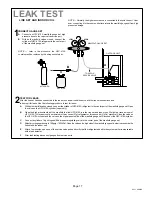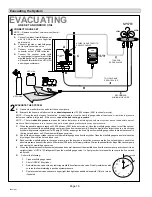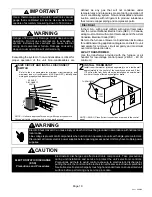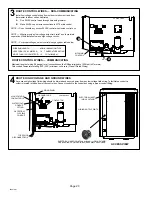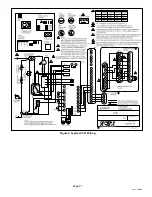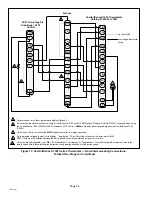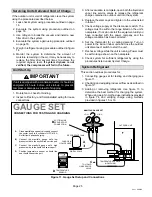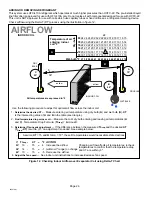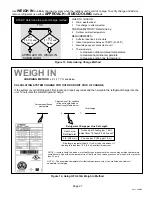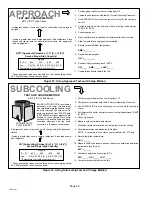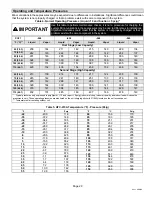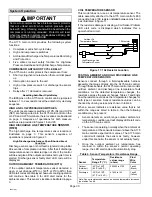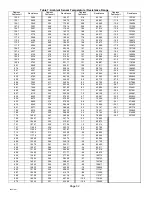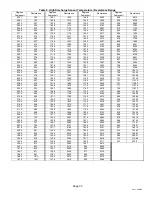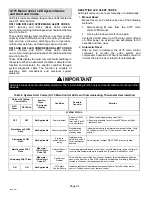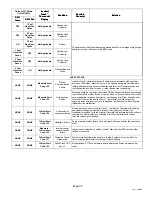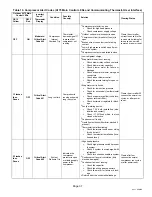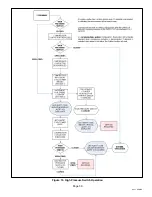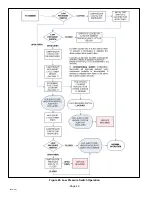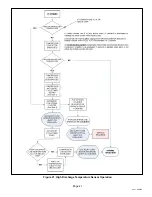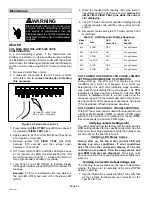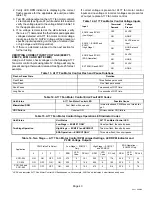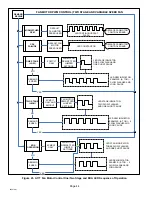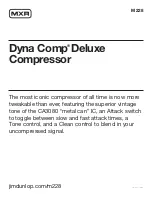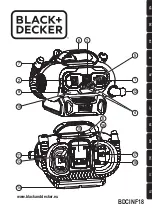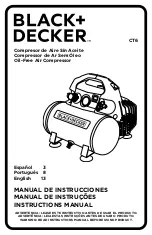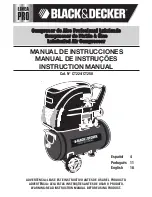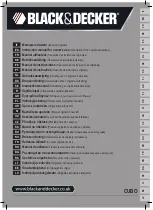
Page 30
506518−01
System Operation
IMPORTANT
Some scroll compressor have internal vacuum protector
that will unload scrolls when suction pressure goes
below 20 psig. A hissing sound will be heard when the
compressor is running unloaded. Protector will reset
when low pressure in system is raised above 40 psig. DO
NOT REPLACE COMPRESSOR.
The A175 main control provides the following system
functions:
S
Compressor anti−short−cycle delay.
S
High and low pressure switches
S
Ambient and Discharge Line Temperatures Monitoring
and Protection.
S
Five strikes lockout safety function for High/Low
Pressure Switches and High Discharge Temperature.
COMPRESSOR ANTI−SHORT CYCLE DELAY
The A175 main control protects the compressor from:
S
Short cycling (five minutes) when there is initial power
up
S
Interruption in power to the unit
S
High or low pressure switch or discharge line sensor
trips
S
Delay after Y1 demand is removed.
Resetting Anti−Short Cycle Delay
The
E33
pins on the A175 main control can be jumpered
between 1 to 2 seconds to reset the anti−short cycle delay
sequence.
HIGH AND LOW PRESSURE SWITCHES
The unit’s reset pressure switches LO PS (S4) and HI PS
(S87) are factory−wired into the A175 main control on the
LO−PS and HI−PS terminals, there locations are illustrated
on page 3. Sequence of operations for both pressure
switches are provided in figures 19 and 20.
HIGH DISCHARGE LINE TEMPERATURE
SENSOR
(RT28)
The high discharge line temperature sensor location is
illustrated on page 3. This sensor’s sequence of
operations is provided in figure 21.
High Discharge Line Sensor Open/Shorted Event
Condition
Discharge sensor open / short fault is ignored during initial
90−seconds of compressor run time. After that, if discharge
temperature sensor is detected open or short, the control
will de−energize all the outputs and anti−short cycle timer is
started. Discharge sensor faulty alert LED code will be
displayed.
OUTDOOR AMBIENT TEMPERATURE (RT13)
If the outdoor ambient temperature sensor detected a
open, or out of range −40ºF to +140ºF (−40ºC to 60ºC) then
LED alert codes are displayed, however cooling operation
will continue. See table 9 for LED alert codes for the
ambient sensor. This sensor’s location is illustrated in page
3.
COIL TEMPERATURE SENSOR
This model does not use a coil temperature sensor. The
cable assembly attached to the A175 main control’s E30
connection has a 10K resister installed between pins 5 and
6 as illustrated in figure 17.
If the resistor is damage or missing, a Coil Sensor Problem
LED alert code is displayed which indicates this a
open/shorted circuit.
10K resistor
High Discharge Line
Temperature Sensor
Ambient Air
Temperature Sensor
Figure 17. 10k Resistor Location
TESTING AMBIENT AND HIGH DISCHARGE LINE
TEMPERATURE SENSORS
Sensors connect through a field-replaceable harness
assembly that plugs directly into the A175 main controll.
Through these sensors, the A175 main control can monitor
outdoor ambient and discharge line temperature fault
conditions. As the detected temperature changes, the
resistance across the sensor changes. Tables 7 and 8 lists
how the resistance varies as the temperature changes for
both type of sensors. Sensor resistance values can be
checked by ohming across pins shown in table 6.
When a sensor indicates a resistance value that is not
within the range as listed in table 6, then the following
condition may be present:
S
Sensor detects an out−of−range outdoor ambient air
temperature condition and will display LED alert code
on the A175 main control.
S
The sensor is operating normally when the ambient air
temperature at the sensor is below or above the A175
main control’s expected ohm values. The A175 main
controll will indicate the sensor as faulty, however
under this scenario, the sensor is not actually faulty.
S
Once the outdoor ambient air temperature has
returned to within the sensor’s normal operating
range, the LED alert code will automatically stop.
Table 6. Sensor Temperature / Resistance Range
Sensor
Temperature
Range °F (°C)
Resistance
values range
(ohms)
Pins/
Wire
Color
Outdoor
(Ambient)
−40ºF to 140ºF
(−40ºC to 60ºC)
280,000 to 3750
3 and 4
(Black)
Discharge
−35ºF to 310ºF
(−37ºC to 154ºC)
41,000 to 103
1 and 2
(Yellow)
Note: Sensor resistance decreases as sensed temperature increases
(see tables 7 and 8.
Summary of Contents for XC21
Page 21: ...Page 21 XC21 SERIES Figure 8 Typical XC21 Wiring ...
Page 39: ...Page 39 XC21 SERIES Figure 19 High Pressure Switch Operation ...
Page 40: ...Page 40 506518 01 Figure 20 Low Pressure Switch Operation ...
Page 41: ...Page 41 XC21 SERIES Figure 21 High Discharge Temperature Sensor Operation ...


